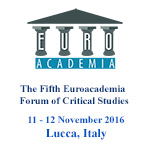Euroacademia Conferences
 Europe Inside-Out: Europe and Europeanness Exposed to Plural Observers (9th Edition) April 24 - 25, 2020
Europe Inside-Out: Europe and Europeanness Exposed to Plural Observers (9th Edition) April 24 - 25, 2020 Identities and Identifications: Politicized Uses of Collective Identities (9th Edition) June 12 - 13, 2020
Identities and Identifications: Politicized Uses of Collective Identities (9th Edition) June 12 - 13, 2020 8th Forum of Critical Studies: Asking Big Questions Again January 24 - 25, 2020
8th Forum of Critical Studies: Asking Big Questions Again January 24 - 25, 2020 Re-Inventing Eastern Europe (7th Edition) December 13 - 14, 2019
Re-Inventing Eastern Europe (7th Edition) December 13 - 14, 2019 The European Union and the Politicization of Europe (8th Edition) October 25 - 26, 2019
The European Union and the Politicization of Europe (8th Edition) October 25 - 26, 2019 Identities and Identifications: Politicized Uses of Collective Identities (8th Edition) June 28 - 29, 2019
Identities and Identifications: Politicized Uses of Collective Identities (8th Edition) June 28 - 29, 2019 The European Union and the Politicization of Europe (7th Edition) January 25 - 26, 2019
The European Union and the Politicization of Europe (7th Edition) January 25 - 26, 2019 7th Forum of Critical Studies: Asking Big Questions Again November 23 - 24, 2018
7th Forum of Critical Studies: Asking Big Questions Again November 23 - 24, 2018 Europe Inside-Out: Europe and Europeanness Exposed to Plural Observers (8th Edition) September 28 - 30, 2018
Europe Inside-Out: Europe and Europeanness Exposed to Plural Observers (8th Edition) September 28 - 30, 2018 Identities and Identifications: Politicized Uses of Collective Identities (7th Edition) June 14 - 15, 2018
Identities and Identifications: Politicized Uses of Collective Identities (7th Edition) June 14 - 15, 2018
From Ms. Marvel to Ms. Shabash: Sex and Power Distribution in Bangladeshi and Western Cultures
-
-

-
Presentation speakers
- Tahseen Salman Choudhury, Research and Publication Officer, Bangladesh Employers’ Federation Bangladesh
- Arzoo Ismail, University of Liberal Arts, Bangladesh
- Download presentation
Abstract:
The medium of comics is a wonderful preserver of culture. Sequential art can effortlessly portray the latest trends and norms prevalent in any society. Comics from different parts of the world can help identify and analyze cultural differences across borders. Comic books talk about people, their dreams, their aspirations, their activities, and their ways of life. The depiction of norms, trends, traditions, celebrations, and conventions of different groups of people are well-contained in this art form. Western comics have been illustrating all these for years, securing their firm foothold in the world of sequential art. During the last few years, owing to various factors like the rise of comic-book based TV shows, superhero movies, and comic cons regularly happening in Bangladesh, the Bangladeshi comic book industry has experienced a boom. Simultaneously, western comics aided in running a comparative study between the respective societies in terms of intergroup oppression, discrimination, and prejudice. A panel-by-panel content analysis based on the established cultural elements was done on the sample, after which SDT on these samples was applied. The results showed westerners exhibiting relatively more liberal attitude, higher civic consciousness, and responsibility-taking mentality, while Bangladeshis were portrayed to be more accepting of social class structures, their adults exercising a disproportionate amount of social power over the younger generation, and the participating society members showing greater disparity in power based on sex.
-
Related Presentations

Federalism (in One Person): An Exercise of Institutional Fantasy for Contemporary Europe
- Mirko Domenico Alagna

Legal Principles and Refugees
- Martin Glick

European Cities and New Inhabitants: A Heritage Contribution by Migrants
- Stefania Scarsini













